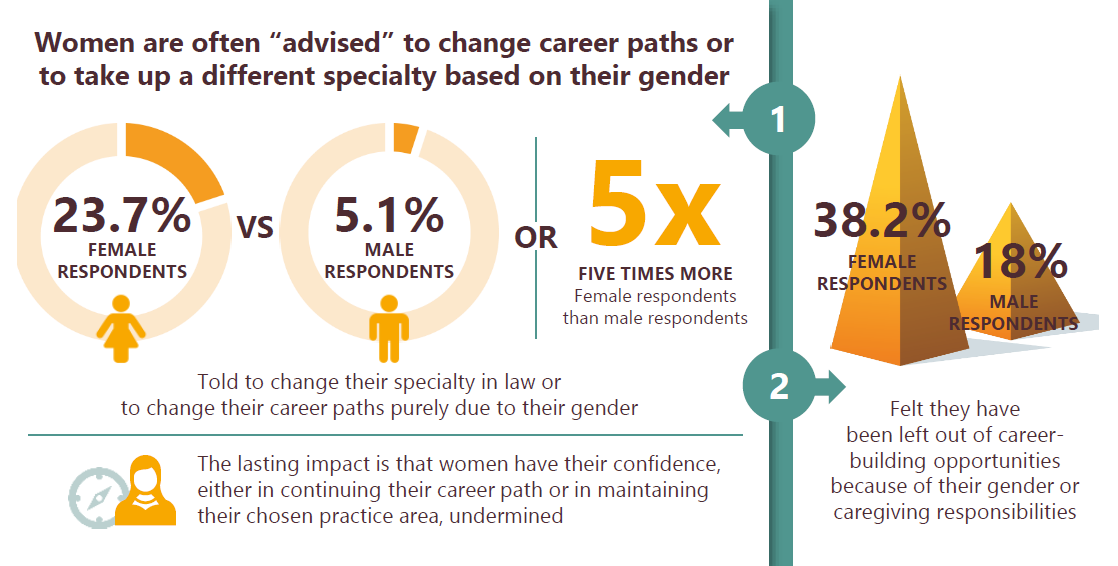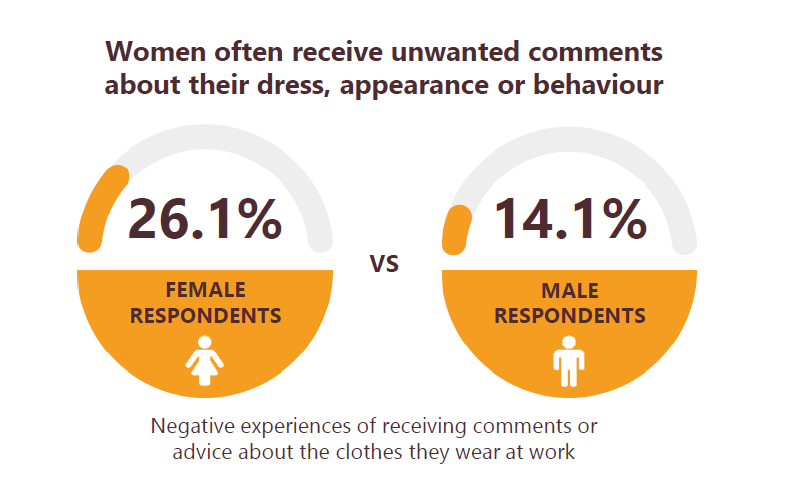Follow us on Telegram and on Instagram @humanresourcesonline for all the latest HR and manpower news from around the region!
share on
Amita Haylock, Partner of Mayer Brown and Co-chair of the firm’s Women’s Network in Asia, shares exclusively with HRO the dos and don'ts for law firms and organisations.
‘Boys’ club’ culture, which involves men forming groups excluding women, therefore favouring men over women when it comes to promotions and professional development opportunities, is prevalent in many industries, and the legal industry is no exception.
According to a joint survey by Mayer Brown and Women In Law Hong Kong (WILHK), women in Hong Kong’s legal sector are facing systemic gender biases that exist at all levels, from the most senior levels to those starting out in the profession.
Among more than 360 surveyed women and men who are currently working or have worked in Hong Kong's legal sector, half of the female respondents feel they have been treated differently to their disadvantage as a result of their gender. Nearly a quarter (23.7%) of female respondents had been told to change their specialty in law or career path, five times more than male respondents.

Moreover, 38.2% of women have felt left out of career-building opportunities because of their gender or care responsibilities. In several cases, female respondents reported their commitment or competence was questioned because of being a caregiver.
Hence, many women are choosing to leave the legal profession, resulting in a gender imbalance at senior levels of private practice and in-house teams.
Some female respondents also reported that they are too often ignored, interrupted or undermined in many workplace settings. Additionally, many women lawyers expressed their struggle to call out this behaviour without being seen as being difficult or not “part of the team”.

On the other hand, women continue to receive unsolicited comments about their appearance or behaviour, with 26.1% of female respondents reporting negative experiences with receiving advice about the clothes they wear at work. Apart from comments on their appearance, many female lawyers received patronising remarks about how they should behave, in case of being viewed as too aggressive and assertive.

Alarmingly, women who do advance up the career path have found they are subject to more, rather than fewer, incidents of micro-aggressive behaviour, with 23.0% of female respondents in senior roles experiencing clients directing questions or queries to a more junior male colleague instead of them.

To dig further into the issue of gender biases and micro-aggressions in the industry, HRO’s Tracy Chan talks exclusively with Amita Haylock, Partner of Mayer Brown's IP & TMT group and Co-chair of the firm’s Women’s Network in Asia, who shares the dos and don'ts for law firms and organisations.
Q: Could you give us examples of everyday behaviour don'ts for our readers to be able to identify and call out such behaviours, and your advice on how to tackle each situation?
- Don’t comment on a woman’s choice of dress or appearance - always remain professional.
- Don’t talk over a woman when she is trying to make her point - and if your client continually seeks the male view, bring in your female colleague: “That’s an interesting question. Maria, I know you know a lot about this, I wonder what your thoughts are.”
- Don’t exclude women from work social events on the assumption she’s unlikely to be up for it – be inclusive and plan your event to appeal to both genders.
Q: What do you think are the underlying reasons, both consciously and unconsciously, that lead to these issues?
Generally, the society we live in has been historically biased positively towards men (voice, power, independence) and negatively towards women (appearance, domestic expectations, dependent). Even though women are in the workplace now more than at any other point in history, those biases still take time to undo.
There has been great progress over the decades in removing the structural biases (legislation, shifts generally in society etc), but removing those unconscious biases still takes longer.
The good news is that today, the majority of men believe in gender equity. The challenge however remains, getting enough to take real action towards gender equity.
Q: With all these challenges and barriers, what are the implications for women’s personal and career progression, as well as overall industry development?
Women enter the legal profession in slightly higher numbers than men. However, as our report flags, the possible knock-on effect of microaggressions is that women can lose confidence or limit themselves. They can feel apprehensive about volunteering for new or challenging tasks.
Unfortunately, we do see women in private practice not seek the promotion they should be eligible for, accept an unequal pay-gap, or worse, leave entirely. The result? A profession that is still male-dominated at the top.
Q: From the government, the corporate to the societal level, there are many initiatives to advocate gender equality in recent years. How effective, in your view, are these initiatives? What’s working and what’s not? What should continue, change, or stop?
There are indeed, and it’s a great thing to see so many efforts to help achieve gender equity.
For the legal profession, given we are not short on graduate female talent, I would say we need systemic review of how we encourage women to go for leadership roles. Meaningful gender targets or formal sponsorship programmes are helpful for this.
But what about when women are promoted? Is there still a pay-gap? Is work flexibility (which men as well as women say they want) an option? Ultimately, it’s a question of persuading all that gender equity is not a zero-sum game, but healthier and more sustainable for all.
Q: On a personal level, how could each stakeholder in the industry help tackle these issues?
Every stakeholder has a role to play – but to pick just one, then I say leaders should be walking the talk.
Senior leadership should be accountable for the general workplace experience. They should make sure that toxic behaviour is not rewarded or ignored. They should set meaningful gender targets and other enablers to better attract, retain and promote women. Senior leaders, both men or women, are essential as allies in tackling this.
Finally, Haylock recommends the following actions for law firms and organisations to address gender bias and make meaningful changes:
HR systems and talent management practices
- Education on biases in the talent lifecycle (which includes talent acquisition, performance management and succession planning).
- Evolving leadership competency models and challenging traditional views on meritocracy e.g. moving away from a “military dictatorship” style of leadership and focusing more on inclusive leadership qualities.
- Revise ways of involvement in business opportunities within the office e.g. open invitation on secondments instead of inviting people based on gender, age or other untested assumptions.
- Policies and systems in place such as interview panels being diverse (it is currently quite common for just one partner to interview a candidate), blind CVs, and ensuring structured interview questions to avoid personal biases.
Training
- Training needs to be impactful and not just a ‘tick-the-box’ exercise. More thought should be put into the content of the training and ensuring it is relevant and relatable for the audience. For example, combine storytelling from colleagues with data for firm management and wider staff population to understand real life case scenarios and incorporating that into the training.
- Dedicated coaching at the senior level and training session on how to encourage inclusive meetings and to speak up, step up, to be more involved at conferences.
- Targeted training for junior colleagues with content that’s more relatable to them. e.g. active bystander training. We have seen some impactful training that combines dramatic immersion into the training so that participants will have to role play and be part of a hypothetical scenario.
Workplace environment
- Organisations need to start from the top in order to move the needle in a workplace setting. Without senior leadership of law firms, chambers and companies giving DEI its due importance, microaggression will not stop.
- Despite DEI training and employee resource groups, senior leaderships are not held accountable for workplace experience. A culture of zero tolerance towards gender inequality, and opportunity to raise concerns (anonymously, if required) will promote accountability for behaviour.
- Leaders should have a KPI on workplace experience - these can be both individual (based on reporting team feedback) and collective (for board/senior management). Measure it by 360-degree feedback and internal colleague engagement surveys.
- Another way to create accountability is by reporting the achievement of gender diversity targets just as law firms and businesses publish profits and financials. Our recommendation is a holistic approach with both meaningful targets and enablers to better attract, retain and promote females.
Image / Provided
share on


